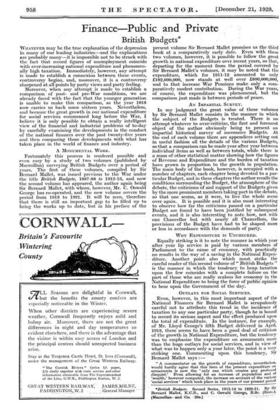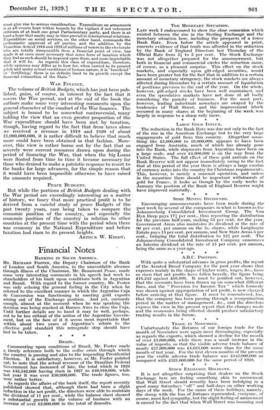Finance Public and Private British -
Budgets*
WHATEVER may be the true explanation of the depression in many of our leading industries—and the explanations are probably many—it is impossible not to be struck with the fact that record figures of unemployment coincide with ever-increasing national expenditure and phenomen- ally high taxation. Immediately, however, any attempt is made to establish a connexion between these events, controversy begins, and, moreover, it is a controversy sharpened at all points by party views and party feeling.
Moreover, when any attempt is made to establish a comparison of post- and pre-War conditions, we are already faced with the fact that the younger generation is unable to make this comparison, as the year 1913 now carries us back some sixteen years. Nevertheless, and because the great growth in our national expenditure for social services commenced long before the War, I believe it is only possible to obtain a really intelligent view of the financial and industrial problems of to-day by carefully examining the developments in the conduct of the national finances over the past twenty-five years and then comparing those developments with what has taken place in the world of finance and industry.
A MONUMENTAL WORK.
Fortunately this process is rendered possible and even easy by a study of two volumes (published by Macmillan) surveying British Budgets over a period of years. The first of these volumes, compiled by Sir Bernard Mallet, was issued previous to the War under the title British Budgets, 1887-88 to 1912-13, and now the second volume has appeared, the author again being Sir Bernard Mallet, with whom, however, Mr. C. Oswald George has co-operated, and the new volume covers the- period from 1913 to 1921. It will be seen, therefore that there is still an important gap to be filled up to bring the works up to date, but in his preface of the present volume Sir Bernard Mallet promises us the third book at a comparatively early date. Even with these two volumes, however, it is possible to follow the great growth in national expenditure over recent years, so that, departing for the moment from the period, covered by Sir Bernard Mallet's volumes, it may be noted that the expenditure, which for 1911-12 amounted to only £182,000,000, now stands at well over £800,000,000, and to that increase War Pensions make only a com- paratively modest contribution. During the War years, of course, the expenditure was phenomenal, but the comparison just made is between periods of peace.
AN IMPARTIAL SURVEY.
In my judgment the great value of these volumes by Sir Bernard Mallet consists in the manner in which the subject of the Budgets is treated. There is no attempt whatever to over-criticize, the first and foremost object of the author obviously being to present an impartial historical survey of successive Budgets. At the end of each volume there are appendices setting out in useful fashion all the details of the various Budgets, so that a comparison can be made year after year between individual items as well as between totals, while there is a mass of other statistical matter showing how the figures of Revenue and Expenditure and the burden of taxation have grown in proportion to the growth in population. The main body of the book, however, is occupied with a number of chapters, each chapter being devoted to a par- ticular Budget, and in these chapters the author recalls the conditions surrounding the Budget, the atmosphere of the debate, the criticisms of and support of the Budgets given by the more prominent members taking part in the debate, so that one seems, as it were, to live ,the whole scene over again. It is possible and it is also most interesting to observe how far the criticisms passed on a particular Budget are found to have been justified by subsequent events, and it is also interesting to note how, not with one Chancellor but with nearly all Chancellors, the provisions of the Budget have had to be shaped more or less in accordance with the demands of party.
WHY EXPENDITURE IS UNCHECKED.
Equally striking is it to note the manner in which year after year lip service is paid by =various members of Parliament to the cause of economy, with practically no results in the way of a saving in the National Expen= diture. Another point also which must strike the careful reader of this second volume of " British Budgets" is the manner in which_ the tendency to heap taxation upon the few coincides with a complete failure on the part of those who are really zealous for economy in the National Expenditure to bring the force of public opinion to bear upon the Government of the day.
- OUTLAYS FOR SOCIAL SERVICES.
Even, however, in this most important aspect of the National Finances Sir Bernard Mallet is scrupulously careful not to attribute this trend in the incidence of taxation to any one particular party, though he is bound to record its serious aspect and the effect produced upon the total of expenditure. In the instance, for example, of Mr. Lloyd George's fifth Budget .delivered in April, 1913, there seems to, have, been a good deal of criticism of the growth in National Expenditure, but the tendency was to emphasize the expenditure on armaments more than the huge outlays for social services, and in view Or what was to happen only a year later, the point is a very striking one. Commenting upon this tendency, Sir Bernard Mallet says :— " A commentator on the growth of expenditure, nevertheless, would hardly agree that this item of the present expenditure on armaments is now the only one which creates any profound disquiet.' Even allowing for an increase of population and of 'wealth,' however computed, the increase on account of the various 'soeial services ' which took place in the years of our present period *British Budgets. Second Series, 1913-14- to 1929,21. By Sit Bernard Mallet, K.C.B., and C. Oswald George, B.Sc. (Econ.)*
(Macnullan- aind - - - -
must give rise to serious consideration. Expenditure on armaments is at all events kept within bounds by the vigilant if not vehement criticism of at least one great Parliamentary party, and there is at least a hope that sanity may m time prevail in international relations. Expenditure on social services, on the other hand, commands the enthusiastic approval of all parties, and the addition by the Franchise Acts of 1918 and 1928 of millions of voters to the electorate who are totally irresponsible from a financial point of view, has made it at once more necessary that some form of taxation which they feel as such should be imposed upon them, and more improbable that it will be. As regards this class of expenditure, therefore, while opinions may differ as to how far, when carried to its present pitch and under actual conditions of human nature, it is ' beneficial' or ' fertilizing,' there is no definite limit to its growth except the financial exhaustion of the State."
WAR FINANCE.
The volume of British Budgets, which has just been pub- lished, gains, of course, in interest by the fact that it covers the War period, and at the end of the book the authors make some very interesting comments upon the general character of the conduct of the War finances. The subject is bound to be somewhat controversial, many holding the view that an even greater proportion of the War expenditure should have been met by taxation, though, having regard to the fact that from taxes alone we received a revenue in 1919 and 1920 of about 11,000,000,000, it is rather difficult to believe that much more could have been obtained in that fashion. More- over, this view is rather borne out by the fact that so severely were current resources drawn upon during the period of financing the War, that when the big Loans were floated from time to time it became necessary for those who desired to make a patriotic response to resort to the banks for large advances, for the simple reason that it would have been impossible otherwise to have raised the amounts required.
PEACE BUDGETS.
But while the portions of British Budgets dealing with the War period are exceedingly interesting as a matter of history, we fancy that more practical profit is to be derived from a careful study of peace Budgets of the past twenty years, care being taken to compare the economic position of the country, and especially the economic position of the country in relation to other countries at the present time with the period when there was economy in the National Expenditure and before taxation had risen to its present heights.
ARTHUR W. KIDDY.



































 Previous page
Previous page